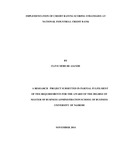| dc.description.abstract | Climate change is increasingly affecting economic, social and political developments throughout the
world. It is no longer an environmental problem but a threat to human security and it is growingly being
viewed as the foremost defining human development problem of the twenty first century. This study
establishes and integrates three core objectives; on climate change and its intersections with human
security issues in Kenya during the period between 1990-2014, on the causes and impacts of climate
change on human security and, on the theoretical perspectives of climate change and human security. By
endorsing a human security framework for evaluating the impacts of climate change this study enables us
to fully understand that climate change affects our day to day lives.
It now widely recognized that anthropogenic climate change is the cause of many of the challenges facing
human beings, be it flooding, food insecurity, vulnerability to diseases, conflict over natural resources,
population displacement, migration and drought. In Kenya, conflict which is one of the severest threats to
humankind is rooted in ongoing human security iss ues and the escalation of these tensions is due to the
impacts of climate change. This study begins by examining the direct and indirect causes of climate
change.
Data was mainly be derived from secondary and primary sources. The data collection tool for the
secondary data was an in-depth information gathering and document analysis. For the primary data, data
collected included quotations, opinions and specific knowledge and background information relating to
the history of the climate change and its effects on human security.
The study recommends that human induced climate change acts as a threat multiplier, aggravating
situations such as water scarcity and tensions within Kenyan. The findings reveal that the important links
between climate change and human security have been neglected and endorsing the human security
framework for evaluating the impacts of climate change enables us to understand who should bear the
burdens of climate change and what kinds of policies are appropriate. The study concludes that policybased
solutions to climate change can contribute to durable solutions. | en_US |

